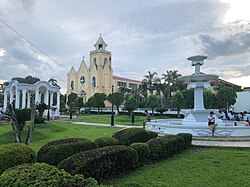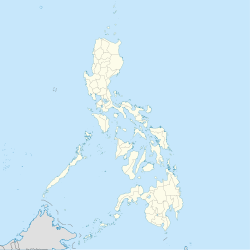Panitan, officially the Municipality of Panitan (Capiznon/Hiligaynon: Banwa sang Panitan; Tagalog: Bayan ng Panitan), is a 3rd class municipality in the province of Capiz, Philippines. According to the 2020 census, it has a population of 42,565 people.[3]
Panitan
Ipiong | |
|---|---|
| Municipality of Panitan | |
 Panitan Plaza and Saint Lawrence the Deacon Parish Church | |
 Map of Capiz with Panitan highlighted | |
Location within the Philippines | |
| Coordinates: 11°27′50″N 122°46′10″E / 11.4639°N 122.7694°E | |
| Country | Philippines |
| Region | Western Visayas |
| Province | Capiz |
| District | 1st district |
| Founded | 1621 |
| Barangays | 26 (see Barangays) |
| Government | |
| • Type | Sangguniang Bayan |
| • Mayor | Katherine D. Dequiña-Belo |
| • Vice Mayor | Audie Lopez Advincula |
| • Representative | Emmanuel A. Billones |
| • Municipal Council | Members |
| • Electorate | 28,658 voters (2022) |
| Area | |
| • Total | 89.88 km2 (34.70 sq mi) |
| Elevation | 34 m (112 ft) |
| Highest elevation | 338 m (1,109 ft) |
| Lowest elevation | −1 m (−3 ft) |
| Population (2020 census)[3] | |
| • Total | 42,565 |
| • Density | 470/km2 (1,200/sq mi) |
| • Households | 10,868 |
| Economy | |
| • Income class | 3rd municipal income class |
| • Poverty incidence | 10.92 |
| • Revenue | ₱ 136.1 million (2020) |
| • Assets | ₱ 205.7 million (2020), 47.51 million (2012) |
| • Expenditure | ₱ 112.3 million (2020) |
| • Liabilities | ₱ 66.96 million (2020) |
| Service provider | |
| • Electricity | Capiz Electric Cooperative (CAPELCO) |
| Time zone | UTC+8 (PST) |
| ZIP code | 5815 |
| PSGC | |
| IDD : area code | +63 (0)36 |
| Native languages | Capisnon Hiligaynon Tagalog |
Pronounced as Panit-an, it is 16 kilometres (9.9 mi) from Roxas City.
Geography
editBarangays
editPanitan is politically subdivided into 26 barangays. [5] Each barangay consists of puroks and some have sitios.
Climate
edit| Climate data for Panitan, Capiz | |||||||||||||
|---|---|---|---|---|---|---|---|---|---|---|---|---|---|
| Month | Jan | Feb | Mar | Apr | May | Jun | Jul | Aug | Sep | Oct | Nov | Dec | Year |
| Mean daily maximum °C (°F) | 27 (81) |
28 (82) |
29 (84) |
31 (88) |
32 (90) |
31 (88) |
30 (86) |
30 (86) |
29 (84) |
29 (84) |
29 (84) |
27 (81) |
29 (85) |
| Mean daily minimum °C (°F) | 23 (73) |
23 (73) |
23 (73) |
24 (75) |
25 (77) |
25 (77) |
24 (75) |
24 (75) |
24 (75) |
24 (75) |
24 (75) |
23 (73) |
24 (75) |
| Average precipitation mm (inches) | 61 (2.4) |
39 (1.5) |
46 (1.8) |
48 (1.9) |
90 (3.5) |
144 (5.7) |
152 (6.0) |
145 (5.7) |
163 (6.4) |
160 (6.3) |
120 (4.7) |
90 (3.5) |
1,258 (49.4) |
| Average rainy days | 12.3 | 9.0 | 9.9 | 10.0 | 18.5 | 25.0 | 27.4 | 26.0 | 25.9 | 24.9 | 17.9 | 14.2 | 221 |
| Source: Meteoblue[6] | |||||||||||||
Demographics
edit
|
| |||||||||||||||||||||||||||||||||||||||||||||||||||
| Source: Philippine Statistics Authority[7][8][9][10] | ||||||||||||||||||||||||||||||||||||||||||||||||||||
In the 2020 census, the population of Panitan was 42,565 people,[3] with a density of 470 inhabitants per square kilometre or 1,200 inhabitants per square mile.
Economy
editPoverty incidence of Panitan
5
10
15
20
25
30
2006
28.00 2009
22.05 2012
29.65 2015
17.94 2018
4.80 2021
10.92 Source: Philippine Statistics Authority[11][12][13][14][15][16][17][18] |
Notable people
editReferences
edit- ^ Municipality of Panitan | (DILG)
- ^ "2015 Census of Population, Report No. 3 – Population, Land Area, and Population Density" (PDF). Philippine Statistics Authority. Quezon City, Philippines. August 2016. ISSN 0117-1453. Archived (PDF) from the original on May 25, 2021. Retrieved July 16, 2021.
- ^ a b c Census of Population (2020). "Region VI (Western Visayas)". Total Population by Province, City, Municipality and Barangay. Philippine Statistics Authority. Retrieved 8 July 2021.
- ^ "PSA Releases the 2021 City and Municipal Level Poverty Estimates". Philippine Statistics Authority. 2 April 2024. Retrieved 28 April 2024.
- ^ "Province: Capiz". PSGC Interactive. Quezon City, Philippines: Philippine Statistics Authority. Retrieved 12 November 2016.
- ^ "Panitan: Average Temperatures and Rainfall". Meteoblue. Retrieved 2 May 2020.
- ^ Census of Population (2015). "Region VI (Western Visayas)". Total Population by Province, City, Municipality and Barangay. Philippine Statistics Authority. Retrieved 20 June 2016.
- ^ Census of Population and Housing (2010). "Region VI (Western Visayas)" (PDF). Total Population by Province, City, Municipality and Barangay. National Statistics Office. Retrieved 29 June 2016.
- ^ Censuses of Population (1903–2007). "Region VI (Western Visayas)". Table 1. Population Enumerated in Various Censuses by Province/Highly Urbanized City: 1903 to 2007. National Statistics Office.
- ^ "Province of Capiz". Municipality Population Data. Local Water Utilities Administration Research Division. Retrieved 17 December 2016.
- ^ "Poverty incidence (PI):". Philippine Statistics Authority. Retrieved December 28, 2020.
- ^ "Estimation of Local Poverty in the Philippines" (PDF). Philippine Statistics Authority. 29 November 2005.
- ^ "2003 City and Municipal Level Poverty Estimates" (PDF). Philippine Statistics Authority. 23 March 2009.
- ^ "City and Municipal Level Poverty Estimates; 2006 and 2009" (PDF). Philippine Statistics Authority. 3 August 2012.
- ^ "2012 Municipal and City Level Poverty Estimates" (PDF). Philippine Statistics Authority. 31 May 2016.
- ^ "Municipal and City Level Small Area Poverty Estimates; 2009, 2012 and 2015". Philippine Statistics Authority. 10 July 2019.
- ^ "PSA Releases the 2018 Municipal and City Level Poverty Estimates". Philippine Statistics Authority. 15 December 2021. Retrieved 22 January 2022.
- ^ "PSA Releases the 2021 City and Municipal Level Poverty Estimates". Philippine Statistics Authority. 2 April 2024. Retrieved 28 April 2024.
External links
editWikimedia Commons has media related to Panitan.


